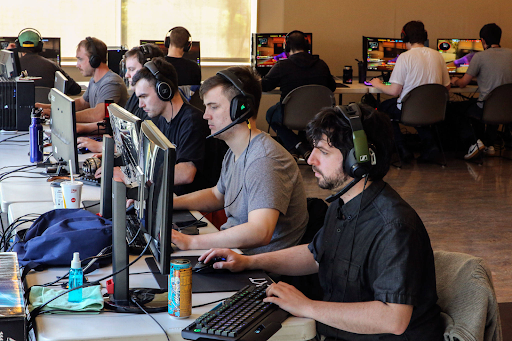Over the past few years, esports has exploded in popularity, with millions of people tuning in to watch their favorite games and players compete at the highest level. As the industry continues to grow and evolve, many are wondering what the future of competitive gaming will look like as the gaming industry looks to be one of the largest entertainment industries in the years to come. In order to appropriately analyze that, we’ll explore some of the key trends and developments in the world of esports and what they could mean for the future of this exciting industry.
From Niche Hobby to Mainstream Phenomenon
The rise of esports has been nothing short of meteoric. What was once a niche hobby enjoyed by a small group of hardcore gamers has now become a global phenomenon, with millions of people tuning in to watch the biggest tournaments and events. In fact, the global esports market is expected to be worth over $1 billion by 2023, up from just $194 million in 2014.
One of the biggest drivers of this growth has been the increased accessibility of Esports to everyday people with average income. Thanks to the rise of streaming platforms like Twitch and YouTube, anyone with an internet connection can now watch live esports events from anywhere in the world for free. This has helped to create a global community of esports fans and players and has also made it easier for new players to get involved in the scene.

The Evolution of Esports Games
Another key trend in the world of esports is the evolution and development of the games themselves. While games like League of Legends and Dota 2 have long been popular in the esports scene, we’re now seeing new games emerge that are specifically designed for multiplayer competitive play.
For example, games like Valorant, which was released in 2020, have been developed with esports in mind from the ground up. These games offer a level of balance and fairness that is essential for competitive play, as well as features like dedicated spectator modes and built-in tools for organizing tournaments and matches.
Mobile Esports on the rise
Mobile gaming has been one of the biggest growth areas in the gaming industry in recent years, and esports is no exception. Games like Clash Royale and Brawl Stars have already established themselves as popular esports titles, and the growth of mobile esports shows no sign of slowing down.
One of the key advantages of mobile esports is that they are highly accessible, with anyone with a smartphone able to play these games and compete at a high level. This has helped to create a more diverse player base, with players from all over the world able to compete in tournaments and events.

The Professionalization of Esports
As esports has grown in popularity, we’ve also seen a professionalization of the industry in the last decade which has largely contributed to its growth. This has led to the creation of dedicated esports organizations, with professional players, coaches, and support staff. These organizations are becoming more sophisticated and business-oriented, with an emphasis on marketing and brand partnerships which has helped to attract more investment into the industry and has also led to increased opportunities for players and other professionals in the esports scene.
In addition, the competitiveness of the general player base in a lot of these multiplayer games has increased significantly as only the top-ranked players on the ranked ladders have the opportunity to start playing professionally. As a result, many players have resorted to hiring eloboosting services in order to reach the highest ranks without too much fuss.
Mainstream popularity
Another way esports is evolving is through its integration into mainstream entertainment. Esports tournaments are now being broadcast on traditional TV channels, such as ESPN and Turner Sports, and streaming platforms like Twitch and YouTube. This increased visibility has helped to legitimize esports and attract new fans.
Esports is also becoming more intertwined with traditional sports, with partnerships forming between esports teams and major sports franchises. For example, the NBA now has its own esports league, featuring 23 teams affiliated with NBA franchises.

Technological Advancements
Given the digital nature, esports is naturally evolving through technological advancements. The emergence of virtual reality and augmented reality has opened up new possibilities for gaming and spectatorship.
For example, VR headsets can be used to create an immersive experience for players and fans, while augmented reality can be used to enhance the viewing experience by overlaying graphics and data on the screen. These technologies are still in their early stages, but they have the potential to revolutionize the way we play and watch esports.
The rise of regional and local events
The expansion of esports has also led to a rise in regional and grassroots events. Esports tournaments used to be limited to a few major events per year, such as the League of Legends World Championship and The International for Dota 2. Now, smaller tournaments are being held in cities around the world, with teams competing for smaller prize pools. This expansion has led to a more accessible path to becoming a professional gamer, with teams and players being scouted from these events.

Expansion of Games and Genres
Esports began with games like Starcraft and Counter-Strike, but now encompasses a wide range of games and genres. From first-person shooters like Overwatch and Call of Duty to strategy games like Dota 2 and League of Legends, there is an esports scene for nearly every type of game. Some newer games like Fortnite and Apex Legends have also quickly established themselves as popular esports titles with massive professional esports competitions.
The Future of Esports
So what does the future hold for esports? It’s clear that the industry is continuing to grow and evolve at an incredible pace, with new games, platforms, and players emerging all the time. But there are also some challenges that the industry will need to overcome if it is to continue to thrive.
One of the biggest challenges will be maintaining the integrity of the competitive play. As esports becomes more professionalized, there is a risk that cheating and other forms of misconduct could become more prevalent. To address this, we’re likely to see increased investment in anti-cheat technology and stricter regulations around player behavior.
Stay tuned to Last Word on Gaming for all the latest gaming news and reviews.
